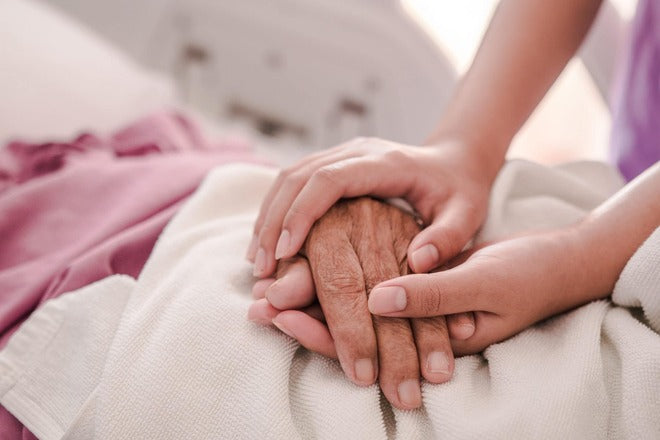
End of life care: Providing care and comfort of your loved ones
Have you been in that position where you have to watch someone at their end of life?
It could be a friend, colleague, family member, or neighbor. How did you feel having to watch that special person fight for their life? Must have been depressing and painful?
It's true a lot of us have been in situations where we didn't know how to help an ailing loved one or what to do to give them comfort.
It's normal to feel this way. Just as it is normal not to know how to plan a loved one's funeral or what casket to buy.
You need not be too hard on yourself. It's not every day one gets to care for a dying person or look after someone receiving medical treatment.
The good news is you'll learn a few things today about caring for a dying person.
Caring for a dying loved one
Once a patient has been declared as nearing their end of life – perhaps because every medical treatment for their condition has failed – what many family members do is they start treating the person like he's dying immediately. It’s common, that people planning a funeral for the loved ones or even own funeral in advance and buying coffins for themselves.

The fact someone's nearing their end of life doesn't mean they're dying immediately. You can take actions to make the few days/weeks/months/years they have left memorable and comfortable for them. On the other hand, planning these kinds of emotional things could be much easier ahead of the time.
For perspective, the World Health Organization reports that 80% of AIDS patients and 67% of cardiovascular disease patients experience moderate to severe pain at the end of their lives.
If I may ask you, what would you do if a friend of yours contracts AIDS today? I'm guessing you might stigmatize. Well, you should know that taking action to support that person – like helping them get palliative care – might make all the difference in their end-of-life experience.
In this post, we want to talk about actions you can take to provide care and comfort for a loved one approaching death.
What is end-of-life care?
End-of-life care refers to the care given to a person that's dying. Technically, it may include physical, spiritual, emotional, and social support for dying people and their families. End-of-life care aims to reduce pain for the dying person and their family so that the patient can pass away as comfortably as possible. In short, it's the type of care you and your healthcare center give to a loved one after the doctor has told you, "We're sorry, there's nothing more we can do." This is a very important topic because sooner or later we all have to face this and this is good to know how to talk to a dying loved one, or terminally ill person.
What to do immediately you realize a loved one has been declared as nearing their end of life?
As earlier mentioned, you need not start planning to buy a casket or organizing with the funeral homes. Instead, what they need is an end of life care – a medical and social procedure that gives them stability until their passing.
Who has the 'final say' on whether or not to proceed with an end of life care?
If the dying person is still within proper medical decision-making capacity, you want to leave all the decisions in their hands. In other words, you let them choose how and where they want to get their end-of-life care.
However, if the patient is in a state where they cannot make good medical judgments for themselves, caregivers should come in and make the best decisions for them. You can have the patient receive their end-of-life care at home, where they're most comfortable. Or have them transferred to a hospice or hospital.
If you can't decide, you can work something out with your medical practitioner.
Who provides end of life care?
The surface answer to that would be medical practitioners. But sometimes, social workers, psychologists, and even religious leaders may be involved.
It all depends on what the caregiver, the health facility, and the rest of the family feel is best for the person.
When does end-of-life care begin?
Once a patient is deemed to die in the coming days, weeks, or months, end-of-life care can begin immediately.
Besides end-of-life care, you can give other relevant care to a person diagnosed with a life-threatening condition. These include:
- Palliative Care
- Hospice care
What is palliative care?
Palliative care is the kind of care given to a person who has been diagnosed with a life-threatening or terminal illness.

Sounds similar to end-of-life care? They're quite different.
Palliative care doesn't always mean someone is dying. In fact, you may receive palliative care earlier in your illness, even before you're told you have XYZ days/months to live.
Palliative care aims to ensure you live a stable, comfortable, and pain-free life even as you navigate your way through a life-limiting condition.
Say you're diagnosed with a life-threatening illness like cancer. You start receiving palliative care to cut out the physical and psychological pain. As you know, one can live with a condition like cancer for many years. Throughout this period, such a person could be receiving palliative care just so they have a good quality of life.
In the moment of palliative care, we have witnessed miracles where someone who was being diagnosed with a terminal illness like cancer pulled through and lived longer than expected. I'm sure you have also heard stories of people who were told they had 6 months or a year to live but, in the end, lived longer than that. In the hopes of miracles like these, palliative care serves to keep the patient's quality of life intact.
What is hospice care?
If you have a loved one whose medical condition seems incurable or who has gone through many procedures to cure an illness but has no positive outcome, subjecting them to hospice care is always advisable.

Hospice care is a type of care administered to a patient when it's clear that it may not be possible to cure their illness. Instead of allowing such a person to wallow in depression and pain, hospice care is given to help maintain a good quality of life.
Like palliative care and end-of-life care, hospice care also caters to the care and support of the ailing person's family.
Administration of hospice care usually consists of professionals like doctors, nurses, counselors, home health aides, spiritual advisors, and so on.
Where is hospice care administered?
It is usually offered at home or in settings like nursing homes, hospice centers, or regular hospitals.
However, according to the National Hospice and Palliative Care Organization, 98.2% of hospice care provided in 2020 were all routine home care.
Similarities and differences between hospice and palliative care: which does your loved one need?
Even with all the explanations so far, it's not uncommon to find people mixing hospice and palliative care up. As such, many fail to begin their hospice or palliative care as soon as necessary.
To make sure you don't make this mistake when caring for a dying person, take your time to study our hospice and palliative care table below.
|
Comparisons |
Palliative Care |
Hospice Care |
|
Who needs it? |
Anyone with a life-threatening condition |
Anyone with a condition doctors think may not be possible to cure anymore |
|
Does it involve medical treatments for the illness? |
Yes. You can keep receiving treatments to combat the illness if you're hoping something might still happen. |
No. The only treatments you receive are for symptoms (pain) relief. |
|
Does Medicare cover fees |
Not in all cases |
Yes. Medicare will cater to some of the charges |
|
Length of care |
You and your insurance plan determines that |
Usually less than one year |
|
When do you get it? |
At any stage of your illness |
Usually, after your illness has been declared as "not responding to medical attempts." |
Here are some simple ways you can bring comfort to a dying loved one
Look at Old Photo Album Together
There is nothing like looking at a photo album with a friend or family member under hospice care. Walking down through memory lane of events that have happened over time in their lives. Looking at funny moments and having a good laugh from different moments like weddings, birthdays, and childhood throwbacks will create a positive vibe within them.

Watch A Movie With Them
Seeing a movie with a person under palliative care might be all you need to spark a reaction from them. Catching up with the latest movies and series is a good way to spend time around them. It helps them take their mind off the pain and enjoy the moment. Who knows, it might even reduce the tensions and emotions among every member of the family involved in this process.
Create a Quiet Environment
Things are easy when everywhere is calm and peaceful. A person close to their end of life will enjoy sitting alone and enjoying their alone time. Loud noise triggers fear as their senses are often heightened. It might be best if you switched off the TV set, reduced conversations around them, and reduced the noise coming from outside.
Show them a glimpse of what will follow their passing
A person nearing their end of life will have lesser reasons to worry if you show them how you're going to care for their interests after their passing.
For example, you could start by showing them videos of how you're taking care of their household chores like cleaning the house, arranging the rooms, cutting the garden, etc.
If the dying person has kids, younger siblings, or pets, you could show them how you're looking over all these.
A dying person may worry that their small business might die after their passing. Reassure them by showing them evidence of recent developments and successes you've overseen while they've been unwell.
Some dying persons sometimes worry whether they'll get a befitting funeral or not. Show them your plans with the funeral home. You may even ask them to choose from a variety of caskets.
Sing To Them and Play Songs
Some people like it when they sing to them or listen to sweet songs in the background. It helps create this relaxing feeling in some patients. Mind you; not all patient enjoys this feeling as some get on the edge while others do not. You should be on the lookout for their mood, so you know when to turn the music off.
Say Calm Words To Them
You need to be calm and cool around them, especially with your words. At this point, the person going through palliative care is going through a lot of pain and emotions. Tell them sweet words like you love them and care about them. You have to make them feel special in such a moment and give them that assurance that you are there when they need you.
Plan their funeral with them
You can bring comfort to a dying person by planning their funeral with them. Of course, this would depend on whether they mention this to you or not. If they don't, you don't want to bring it up as it might further down their spirit.
However, if they're hell-bent on speaking about it, the best you can do is start the funeral planning with them. If possible, bring a representative from the funeral home to come see them. Or, as we said earlier, have them choose from a variety of casket options.

Being Close To Family Relation
This helps with the emotional support of a dying person when he has all his family relations around. For an elderly person, this is the right to be close with their grandchildren, children, and old friends. You can arrange a visit for them or video calls for them to talk to people they want to see before they die.
Advise them to write their will
In this stage, where a person is close to death, it's advisable to tell them to write their will before passing on. It gives a proper understanding of how they want to share their property among their families.
Conclusion
The moment we spend with our family members, friends, and more during their end-of-life care is of great importance. Be ready to offer assistance, care, and support as much as possible. Be ready to provide whatever gentle kindness you are called upon to offer and trust that you will know instinctively what to do when a need arises.
Blog Author: Tim


